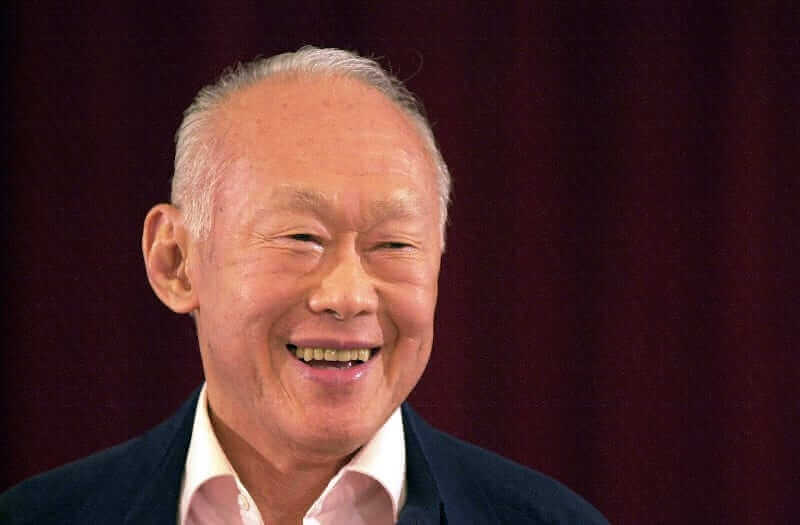List of Contents
Lee Kuan Yew was a statesman and political figure in Singapore who played a crucial role in the country’s transformation from a colonial outpost to one of the most economically prosperous nations in Southeast Asia. Born in 1923, he co-founded the People’s Action Party in 1954 and became the country’s first prime minister when Singapore gained independence from Malaysia in 1965.
During his time in office, which lasted until 1990, Lee implemented policies aimed at improving the standard of living for citizens and attracting foreign investment. He modernized the economy, built-up infrastructure, and developed a reputation for being a strict but effective leader. Lee’s policies and leadership style have been both praised and criticized, but his impact on Singapore’s history cannot be denied.
Early Life and Political Career
Born in 1923 in Singapore, Lee was the son of a wealthy businessman who had immigrated to the British colony from southern China. He received his early education at Telok Kurau English School and Raffles Institution, two of the finest schools in colonial Singapore.
Lee was known for his academic excellence, particularly in the subjects of mathematics and English, and his exposure to the Western way of life at an early age shaped his worldview and ambitions. He went on to study law at the University of London, where he excelled in his studies and was known for his fierce intellect and oratory skills.
Lee’s education and exposure to Western ideals provided him with a strong foundation for his later political career. He returned to Singapore after graduation and became involved in the local political scene, quickly rising to prominence as a fierce advocate for independence and democracy. Lee would go on to play a pivotal role in shaping the future of modern Singapore, and his childhood and education would serve as a foundation for the transformative leadership he would provide for the country over the course of several decades.
Key Moments in Political Journey
Lee Kuan Yew political journey began in the 1950s when he and a group of like-minded individuals sought to gain independence from British colonial rule. Over the next few decades, Lee Kuan Yew played a crucial role in shaping the destiny of Singapore, transforming it from a third-world country into a developed and prosperous nation.
1954: Lee Kuan Yew co-founded the People’s Action Party (PAP) and became its first Secretary-General. The party aimed to secure self-governance for Singapore and worked to end British colonial rule.
1959: After five years of hard work, the PAP finally achieved its goal and Singapore became self-governing. Lee Kuan Yew became the country’s first Prime Minister and worked to establish stability, build infrastructure and create jobs.
1963: Lee Kuan Yew led Singapore through a merger with Malaysia in 1963, but the union was short-lived. Political tensions between the two countries soon became unbearable and in 1965, Singapore became an independent nation once again.
The 1970s: Lee Kuan Yew’s focus shifted towards improving the economy and the standard of living for Singaporeans. He introduced a number of measures to encourage foreign investment and create jobs. He also implemented a strict law and order policy to maintain stability and ensure the safety of Singaporeans.
The 1980s: The 1980s marked a new era for Singapore as the country achieved rapid economic growth and became a hub for international trade. Lee Kuan Yew continued to shape the country’s destiny, pushing for innovation and modernization.
These key moments in Lee Kuan Yew’s political journey demonstrate his unwavering commitment to building a better future for Singapore. His bold and visionary leadership played a major role in transforming the country into the prosperous and developed nation it is today.
Key decisions and policies implemented
One of the most critical decisions made by Lee was to focus on economic development. He realized that in order to improve the standard of living for the citizens, the country needed to attract foreign investment and create jobs. To achieve this, he liberalized the economy, reduced the role of the state in business, and implemented a series of measures to attract foreign investment. This led to a rapid increase in economic growth and helped to create a strong middle class.
Another important policy implemented by Lee was his focus on education. He believed that education was the key to unlocking the full potential of the people and he implemented a series of measures to improve the quality of education in the country. This included increasing the budget for education, improving the quality of teachers, and introducing new curriculums to better prepare students for the future.
Lee’s focus on housing was another important policy that transformed the country. He recognized the importance of providing affordable and decent housing to the citizens and implemented measures to build a large number of public housing units. This not only improved the standard of living for the citizens but also helped to reduce poverty and create a more equal society.
Lee’s strong stance on law and order also played a crucial role in transforming Singapore. He introduced strict laws to combat corruption, drug trafficking, and other criminal activities. This helped to create a safe and secure environment for the citizens and also attracted foreign investors who were looking for a stable and secure environment for their businesses.
Overcoming Challenges
One of the biggest challenges that Lee faced was the lack of resources and manpower in Singapore. When he first took office, Singapore was a developing nation with limited resources and a small population. Despite these difficulties, Lee was able to build a strong economy by attracting foreign investment and encouraging entrepreneurship.
Another major challenge that Lee faced was the racial tension between the different ethnic groups in Singapore. To address this issue, he implemented policies that encouraged integration and social harmonies, such as mandatory education in the official languages of Singapore, English, Malay, Chinese, and Tamil.
Lee also faced criticism from the international community for his strict law and order policies, which included the use of the death penalty for certain crimes and censorship of the media. However, he believed that these policies were necessary for maintaining stability and security in Singapore.
Criticism
Lee Kuan Yew’s policies are not always without their criticisms:
- Authoritarianism
Lee Kuan Yew is often criticized for his strict and authoritarian leadership style. He implemented strict censorship laws, limited freedom of speech and political opposition, and jailed political dissidents. - Human Rights
Singapore’s human rights record under Lee Kuan Yew’s leadership has come under scrutiny. The country’s laws on freedom of speech, assembly, and expression have been criticized as being too restrictive. - Economic Policies
Lee Kuan Yew’s economic policies have been criticized for being too focused on maximizing profits at the expense of workers’ rights and the environment. Critics have accused the government of prioritizing the interests of big corporations over the needs of the people. - Immigration
Lee Kuan Yew’s immigration policies have been criticized for being discriminatory and favoring foreign workers over local citizens. - Housing Policies
Lee Kuan Yew’s policies on public housing have also come under criticism. While the government has built many public housing units, critics argue that these units are too small and overcrowded.
The Legacy
Under his leadership, Singapore became one of the fastest-growing economies in the world, attracting multinational corporations, and transforming itself into a hub for international trade. Lee Kuan Yew’s vision of a modern and technologically advanced society was realized in Singapore, and the country became a model for developing nations around the world.
Lee Kuan Yew’s influence on Singapore’s political and economic development has been immense. He was a firm believer in meritocracy, and under his leadership, Singapore implemented a merit-based system of education and governance. This approach helped to foster a culture of excellence and allowed the country to attract and retain highly skilled workers. Additionally, Lee Kuan Yew was a strong advocate for free market economics and was instrumental in attracting foreign investment to the country.
Under his leadership, the country became known for its low crime rates, clean streets, and overall sense of order and safety. Additionally, Lee Kuan Yew was a strong advocate for multiculturalism, and his policies helped to foster a harmonious and inclusive society.
His influence extends beyond the borders of Singapore and has been felt around the world. His reputation as a visionary and transformative leader has inspired many other leaders, and his policies have been studied and emulated by countries around the world. In recent years, Lee Kuan Yew has been widely recognized as one of the greatest leaders of the 20th century, and his legacy continues to be felt today.
Despite his passing, Lee Kuan Yew’s impact on Singapore and the world will continue to be felt for generations to come.







